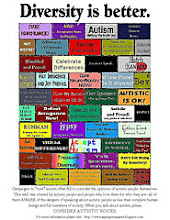Handy Hint [possibly] Number 1
 Note – this of no use whatever to anyone inhabiting Britain or Europe]
Note – this of no use whatever to anyone inhabiting Britain or Europe]
Whilst I would like to claim credit for this tip, unfortunately as usual, I have to thank the Muse for her psychobabble ramblings and acute powers of observation.
If you have a child with a speech delay, averaging 5 hour periods of silence, this may a useful way of making any potential listener, listen to what your child may eventually be able to utter or stutter out. It’ really very simple – begin each sentence thusly:
“Please may I…………” fill in the blank. Even if this comes out mangled ‘peez ma hi……’ it still works quite well.
I started out extracting this phrase from my children from birth, using the blanket approach to child rearing. This is what I did with the girls, so I attempted to do the same with the boys. It was of course a miserable failure for many a long year, but eventually they both managed to acquire an approximation of this. I wanted them to use it because that is how people are supposed to start a request. After diagnoses and other hurdles, it was pointed out to me that a simple demand for ‘cookie’ was far more efficient when dealing with a speech delayed child. Why make life unnecessarily difficult?
Extracting any word from a child with a speech delay can seem Herculean task, however there are a couple of unforeseen benefits of using this phrase.
Firstly, the only person who is likely to listen to your speech delayed child is an adult, children just don’t have the patience or interest. Therefore if you speak to an adult and your first word is ‘please,’ subconsciously you already have that adult’s attention – ooo a polite child, I might just give them the benefit of the doubt.
Secondly, the use of the word ‘may’ rather than ‘can,’ is also polite, which confirms to the adult that they might be on to a winner afterall. This combination generally results in a more patient approach from the adult in question. There is the remote hope that if the child can just keep going and squeeze out another word, the child is likely to be rewarded with a positive response, which in turn is self reinforcing, which means that they’re more likely to try again because it works.
However, I should point out that if you are contemplating using this strategy and turning yourself into a drill sergeant to achieve this, bear in mind that in a few years time when the child is older, you will need to abandon this plan and replace it with something more socially appropriate, unless you wish your child to sound like Little Lord Fontlaroy, which will not endear him to any potential peer group. 
"Michele Garcia Winner" has a great deal of expertise in this field, namely social appropriate use of language and social skills generally, but since we are way below such advance techniques, this more basic approach might help somebody somewhere.
I suspect that a mid-Atlantic accent would be of benefit too, but I’ll need help with that one.







